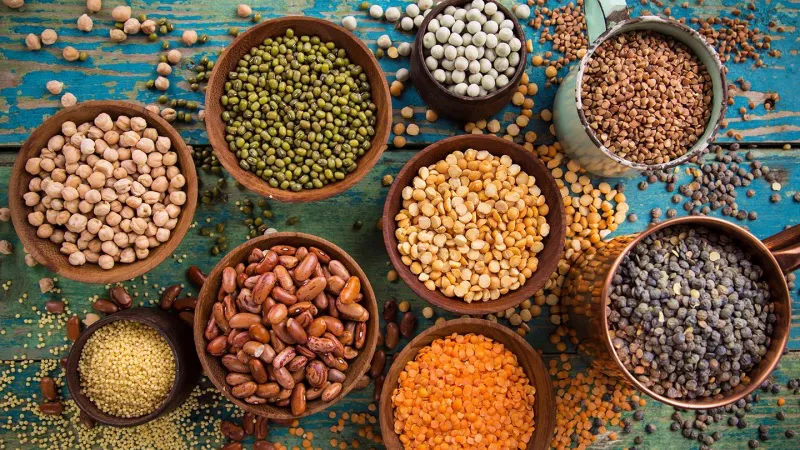1. Introduction
Seeds, often overlooked in the realm of nutrition, pack a powerful punch when it comes to essential nutrients, and among them, protein stands out as a key player. As the building blocks of life, proteins play a crucial role in various bodily functions, from muscle development to immune system support. This exploration delves into the diverse world of seeds, unveiling the contenders that boast the most protein content. Whether you’re a plant-based eater, an athlete, or simply aiming to diversify your nutrient intake, discovering the seeds with the most protein can be a game-changer in optimizing your overall dietary profile.
2. Chia Seeds
In the realm of seeds, chia seeds stand out as tiny titans with an impressive nutritional profile, and they are recognized for having some of the most protein in seeds. These small but mighty seeds are a rich source of complete protein, providing all nine essential amino acids that the body cannot produce on its own. Just two tablespoons of chia seeds can contribute a notable amount of protein, making them an excellent addition to various dishes. Beyond protein, chia seeds are celebrated for their omega-3 fatty acids, fiber, and versatile culinary applications, making them a popular choice among health-conscious individuals.
3. Hemp Seeds
Hemp seeds emerge as another nutrient-rich powerhouse in the realm of seeds, boasting one of the most protein-rich profiles. These seeds, derived from the Cannabis sativa plant, are a complete protein source, containing all essential amino acids in optimal ratios. Hemp seeds are particularly valued for their digestibility, and they offer a significant protein boost along with essential fatty acids, including omega-3 and omega-6. Whether sprinkled on salads, blended into smoothies, or incorporated into various recipes, hemp seeds bring a nutritional punch that extends beyond protein content.
4. Pumpkin Seeds
Pumpkin seeds, also known as pepitas, carve a niche for themselves as protein-packed gems among seeds. These green seeds, harvested from pumpkins, are not only a rich source of protein but also boast an array of other nutrients. Pumpkin seeds are abundant in magnesium, iron, zinc, and fiber, contributing to overall health and well-being. With their nutty flavor and crunchy texture, pumpkin seeds make for a delightful snack on their own and can be easily incorporated into both sweet and savory dishes, enhancing the nutritional profile of meals.
5. Sunflower Seeds
Sunflower seeds, the edible kernels harvested from sunflowers, bask in the brilliance of being a protein-rich seed option. These seeds offer a wholesome combination of protein, healthy fats, and essential vitamins and minerals. Sunflower seeds are particularly noteworthy for their vitamin E content, an antioxidant that plays a role in protecting cells from damage. Whether consumed as a convenient on-the-go snack or sprinkled over salads and yogurts, sunflower seeds contribute not only to protein intake but also to the overall nutritional diversity of the diet.
6. Flaxseeds
Flaxseeds, renowned for their omega-3 fatty acid content, also emerge as protein powerhouses, further solidifying their status as nutritional all-stars. While flaxseeds are not considered a complete protein due to their amino acid profile, they still provide a valuable protein source along with other essential nutrients. Ground flaxseeds are a popular choice for enhanced digestibility and can be easily incorporated into various recipes, including smoothies, oatmeal, and baked goods. The combination of protein, fiber, and omega-3s makes flaxseeds a versatile and health-promoting addition to a balanced diet.
7. Sesame Seeds
Sesame seeds, the tiny seeds derived from the sesame plant, contribute to big nutrition with their impressive protein content. While they may not be as commonly recognized for their protein as some other seeds, sesame seeds pack a considerable protein punch alongside an array of essential minerals, including copper, manganese, and calcium. These seeds are a versatile culinary ingredient, adding a rich, nutty flavor to both sweet and savory dishes. Whether sprinkled over salads, incorporated into tahini, or used as a coating for proteins, sesame seeds offer a delightful and nutritious addition to various cuisines.
8. Quinoa
While often mistaken for a grain, quinoa is actually a seed that stands out for its protein power among plant-based foods. Quinoa is a complete protein, providing all essential amino acids, making it a valuable inclusion in vegetarian and vegan diets. Beyond protein, quinoa offers a host of nutrients, including fiber, magnesium, and iron. Its versatility in the kitchen makes quinoa a staple ingredient in a variety of dishes, from salads to grain bowls. As a seed with a balanced nutritional profile, quinoa contributes to both protein intake and overall dietary diversity.
9. Almonds
Almonds, often recognized as nuts, are technically seeds encased within a protective outer shell. These nutrient-dense seeds in disguise are not only renowned for their healthy fats but also stand out for their protein content. Almonds are a source of complete protein, and they bring a range of essential nutrients to the table, including vitamin E, magnesium, and fiber. Whether enjoyed as a snack on their own, blended into almond butter, or sprinkled over yogurt, almonds offer a satisfying crunch and nutritional excellence.
10. Quorn
Quorn, a protein-rich alternative derived from a type of fungus known as mycoprotein, represents a unique entry in the world of protein-rich seeds. While not a traditional seed, quorn’s mycoprotein content deserves recognition for its protein density. Mycoprotein is a complete protein source and is often used as a meat substitute in various vegetarian and vegan products. With its texture and taste resembling meat, quorn provides a protein-packed option for those looking to diversify their protein sources and explore innovative plant-based alternatives.
11. Buckwheat
Buckwheat, often considered a pseudograin due to its grain-like characteristics, is a seed that brings protein appeal to the table. Despite its name, buckwheat is not related to wheat and is gluten-free. Buckwheat seeds are a source of high-quality protein, offering all essential amino acids. Beyond protein, buckwheat provides a spectrum of nutrients, including fiber, manganese, and antioxidants. Commonly used in the preparation of pancakes, soba noodles, and porridge, buckwheat adds a nutty flavor and nutritional depth to a variety of dishes.
12. Pomegranate Seeds
Pomegranate seeds, though more commonly associated with their juicy and sweet characteristics, contribute a surprising amount of protein to the mix. These vibrant seeds, nestled within the ruby-red arils of the pomegranate, are not only bursting with antioxidants but also offer a modest protein content. While pomegranate seeds may not be a primary protein source, their inclusion in salads, yogurt bowls, or as a topping for various dishes provides a refreshing and nutritious touch.
13. Black Seeds (Nigella Sativa)
Black seeds, derived from the Nigella sativa plant, are a lesser-known but noteworthy addition to the list of protein-rich seeds. These small, black seeds have been traditionally used for their potential health benefits. While not as widely studied as some other seeds, black seeds do contribute protein to the diet and are often used in culinary applications, adding a slightly bitter and peppery flavor to dishes.
14. Poppy Seeds
Poppy seeds, often used as culinary accents in various cuisines, offer more than just visual appeal—they also bring a protein boost to the table. These tiny seeds derived from the opium poppy plant contribute a modest amount of protein along with essential minerals such as calcium, phosphorus, and iron. While poppy seeds are commonly used in baking, they can also be sprinkled over salads, added to dressings, or incorporated into savory dishes to enhance both flavor and nutritional content.
Conclusion
In conclusion, the world of seeds unfolds as a treasure trove of protein-rich options, each offering a unique set of nutrients and culinary possibilities. From the tiny yet mighty chia seeds to the nutrient-dense almonds and the protein powerhouses like hemp seeds and quinoa, seeds provide a diverse palette for crafting a protein-rich and nutritionally balanced diet. Whether you’re following a plant-based lifestyle, seeking alternatives to traditional protein sources, or simply aiming to enhance the nutritional diversity of your meals, incorporating a variety of seeds can be a delicious and health-conscious way to meet your protein needs. Embrace the versatility of seeds and let them take center stage in elevating both the flavor and nutritional content of your culinary creations.
[inline_related_posts title=”You Might Be Interested In” title_align=”left” style=”list” number=”6″ align=”none” ids=”3739,3532,3536″ by=”categories” orderby=”rand” order=”DESC” hide_thumb=”no” thumb_right=”no” views=”no” date=”yes” grid_columns=”2″ post_type=”” tax=””]































